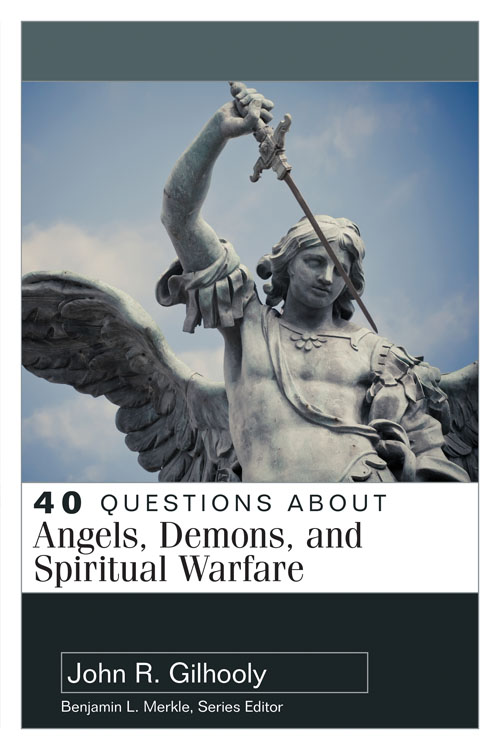
The basic word for “angel” is used numerous times in the Bible. It appears more than 190 times in the Old Testament and more than 170 times in the New Testament. We can draw several general conclusions about angels from the Bible, but there is no sustained treatment of angelology in Scripture. Consequently, angelology is more cursory and piecemeal than some Christian doctrines.
“Angel” Describes a Vocation
There are as many as sixteen Hebrew words that are sometimes translated as “angels” in English. The most common word is mal’akh, which means “messenger.” In fact, in more than half its uses, mal’akh unambiguously refers to a human messenger. In New Testament Greek, there are fewer words used for angels, but the basic word angelos also means “messenger” and often refers to a human messenger. So the language of the Bible stresses the function of angels more than their nature.
Contextual clues allow translators to decide whether the messenger in question is human or angelic. However, the biblical authors sometimes use the ambiguity of the word to great effect. For example, in Genesis 19, two angels visit Lot in Sodom and report back to God that the city is indeed wicked and worthy of destruction. In verses 1 and 15, these two figures are called mal’akhim (the plural of mal’akh). English translations univocally translate this word as “angels.” However, the figures are referred to as men seven times in the surrounding passage (Gen. 18:2; 19:5, 7, 10, 12, 16). The tension between the perspective of the narrator and the perspective of the characters in the story shows us that these angels are mysterious creatures who are capable of appearing indistinguishable from men. At first, Abraham and Lot do not recognize them as angels, yet these strangers are able to pull Lot away from the men of city and to strike them with blindness (Gen. 19:10–11). These appear to be more than men! The misidentification of angels with people is not limited to only this passage (see Judges 13).
Unlike humans, angels are not created with bodies, but like us, angels are intelligent and capable of making choices with moral responsibility. In the book of Hebrews, the proof-text for their incorporeality is 1:14: “Are they not all ministering spirits . . . ?”1 The implied answer to the question is, “Yes, they are ministering spirits,” and the word spirits (pneumata) refers to their incorporeal nature (Luke 24:39). It is also true, however, that angels can appear as bodily creatures, which Hebrews also attests (Heb. 13:2).
There is a gap in the biblical witness in this regard, because Scripture gives no explanation for how angels take on or “assume” a body. However, the Bible demonstrates that it is in special circumstances (such when God wishes to communicate a message) that angels take on a body. In some cases, angels are merely visible in dreams or by special empowering (2 Kings 6:17; Luke 2:31).
Divine Messengers
In interacting with humans, the angels’ main function is what their name implies: to deliver messages. In particular, angels are associated with important announcements as well as words of judgment and prophecies.
The most famous good news brought by angels is the announcement to the shepherds that Christ has been born. Luke tells us that an angel of the Lord appeared to them, and the glory of the Lord shone around them, and a great multitude of heavenly beings praised God ( 2:8–9). Angels announce the birth of many significant people in the Bible, including John the Baptist (Luke 1:11–22), Samson (Judges 3:3–7), and Ishmael (Gen. 16:10–11).
Sometimes, the message of the angels is one of judgment. A good example can be found in Genesis 19:13, in which the two angels warn Lot about the coming destruction of Sodom. In other cases, angels act upon the words of judgment God has spoken. For example, John tells us in Revelation 16 how seven angels will pour out bowls of God’s just wrath. Not only are these angels the means of the judgment, they are also involved in communicating the message of judgment to John (Rev. 17:1).
God also involved angels in the giving of the law to his people Israel, as Moses notes in Deuteronomy 33:2. The New Testament provides more details of this event in several texts. When Stephen rebukes the Jewish leaders for their persecutions, he says the Jews “received the law as delivered by angels and did not keep it” (Acts 7:53). Likewise, Paul writes to the Galatians that the law “was put in place through angels by an intermediary” (Gal. 3:19).
Angels are deliverers of prophetic messages as well. Sometimes, these prophetic messages are words of judgment or of glad tidings as mentioned above. In other cases, these prophetic words are more extensive. Daniel 10 records the arrival of an angel who recounts to Daniel the future history of the nations.
Ministers
Provision and Protection of God’s People
Angels have the duty of ministering to Christians. Hebrews 1:14 says, “Are they not all ministering spirits sent out to serve for the sake of those who are to inherit salvation?” In other words, angels fulfill their ministerial duties (such as delivering God’s messages) for the sake of Christians.
There is not a tremendous amount of detail about how specifically angels minister on a regular basis, but the Old Testament offers some specific examples of angels ministering to individuals. In 1 Kings 19:5–7, when Elijah the prophet is hiding from Jezebel, an angel feeds him. In Daniel 6:22, God sends an angel to protect Daniel and shut the lions’ mouths. Angels protected the apostles as well by freeing them from prison (Acts 5:17; 12:5). They also directed the apostles where to go (Acts 8:26) and, on at least one occasion, directed a devout Gentile to the apostles so he could hear the gospel (Acts 10). It may even be that angels carry the dead in Christ to dwell with him in the intermediate heaven (Luke 16:22)!
Service to Christ
In addition to ministering to Christians, angels minister to the needs of the Son. For example, after Jesus is tempted in the wilderness, angels come and minister to him (Matt. 4:11). In Gethsemane, while the disciples fall asleep and fail to support Jesus in prayer, an angel comes to provide him strength (Luke 22:43). Later, when Peter violently defends Christ in the garden, the Lord rebukes him by saying, “Do you think that I cannot appeal to my Father, and he will at once send me more than twelve legions of angels?” (Matt. 26:53).
This angelic ministry to the Son is not isolated to his adult life. When he was a child, the Father sent angels to protect Jesus and to direct Mary and Joseph in caring for him. And it is an angel who warns Joseph to flee Herod’s wrath (Matt. 2:13).
Worship of God
Angels are ministers of praise and worship of God on his throne. In Isaiah 6:3, Isaiah describes the seraphim calling to one another, “Holy, holy, holy is the Lord of hosts; the whole earth is full of his glory!” Another angelic praise is recorded by John in Revelation 4:8, where the “living creatures” around God’s throne ceaselessly confess his holiness. Sometimes people describe these scenes as choirs of angels singing anthems to God, but Scripture does not generally use the verb “to sing” (Hebrew: shir; Greek: psallo, hymnos) to describe their activity.2 Regardless of the timbre of these confessions, they are in praise to God.
Army of Heaven
Angels are described in both the Old and New Testaments as a heavenly army. Often, angels are the reason that Israel is able to overcome its enemies in battle. In some cases, a single angel is described as leading the people, whereas at other times the whole army of heaven is depicted. In both cases, the duty of protection is in view.
Angel Before You
A repeated formula in the Old Testament is God’s promise to Israel that he will send his “angel before” them. Abraham tells his servant in Genesis 24:7 that God “will send his angel before you.” The Lord makes this promise himself to the Israelites in Exodus 23:20: “Behold, I send an angel before you, to guard you on the way and to bring you to the place that I have prepared.” This duty of leadership, protection, and direction is an important function of angels.
Angelic Warriors
Angels sometimes fight on behalf of God’s people in Scripture. A famous example is in 2 Kings 6:16–20, when horses and chariots of fire surround the prophet Elisha. These normally invisible figures do not actually partake in the battle (in fact, there is no battle), but they give comfort to Elisha and his servant with their presence. Another example in 2 Kings is when the angel of the Lord strikes down 185,000 Assyrians who are besieging Jerusalem (19:35; see also 2 Chron. 32:20). In the New Testament, John also describes a vision of Michael and his angels fighting against Satan and the demons in a war in heaven (Rev. 12:7–8).
Summary
Angels serve God as his messengers, but this duty expresses itself in many ways. Angels deliver messages of hope, prophecy, law, and judgment. Chiefly, they now serve Christians (Heb. 1:14). This service probably manifests itself in certain divine protections and in the joy angels find in the salvation of the lost (Luke 15:10). Of course, because angels are spirits, they may frequently be serving God in ways we do not even recognize.

by John R. Gilhooly
1. All Scripture quotations are from the English Standard Version.
2. An exception might be Job 38:7: “when the morning stars sang (be’ran) together and all the sons of God shouted for joy?” The word comes from the root ranan, which means “to cry out.” Many English translations render this word as “sang,” but the textual basis for such a decision is weak.

